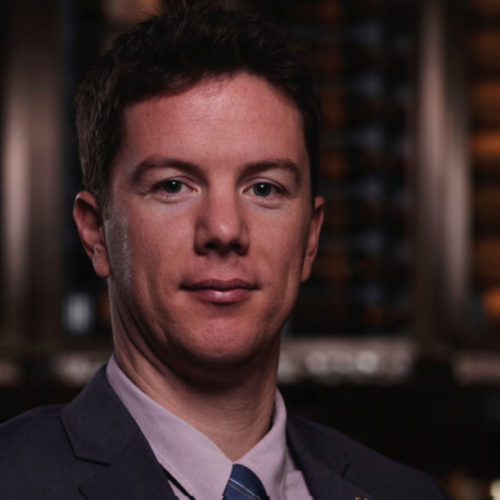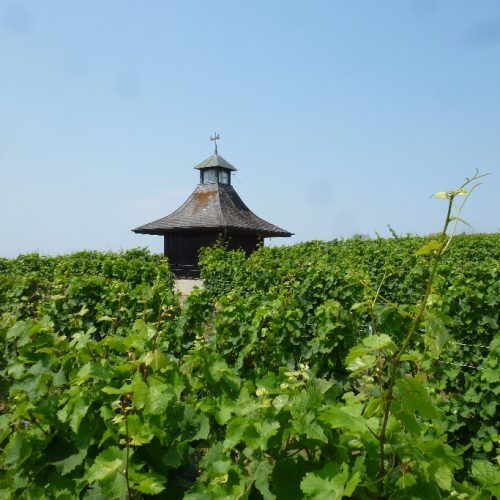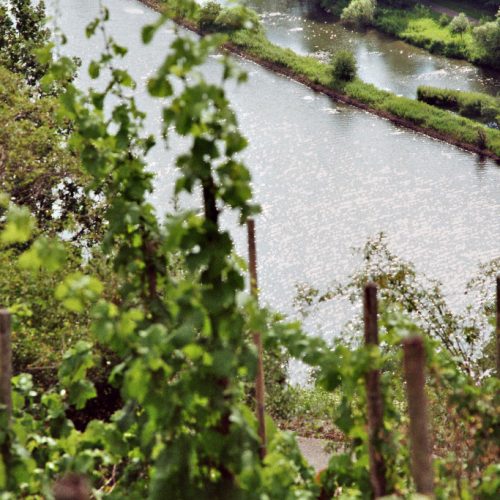The Wines
2014 Graacher Riesling trocken„The wines give a direction like we interpret it later.“, says Christoph Schaefer. And it is amazing to have a good local wine from 2014 on the palate. Already now it pushes forward, strong with good structure and balance between fruit and sourness. Tight minerality complements the strong impression. On the outflow it is demanding, but it stays fresh because of its fruit composition and gives you a feeling of comfort, which stays for quite a while. You can open the bottle, without a doubt, already.
2014 Graacher Himmelreich Riesling Kabinett
This is where the sky and kingdom come together. It is rich on amazing mineral slate, but also on fruit like mandarin, apple and a bit of smoke. On the palate it is shown by lively sourness, that wants to be tamed. Sweetness and fruit poke each other. A heavenly outflow. After a few years you are probably walking on air. Just leave it for a bit longer.
2012 Graacher Domprobst Riesling Spätlese #05It is starting to be a lot of fun. This one from 2012 shows what possibilities of complexity there are. Ad absurdum – taste components are already joining each other. Especially the mineral components are the protagonist, which combine with the sweetness of fruit into a salty sweetness. The wine already seems very present. The sourness is still alive. It is probably going to get to a point in about ten years time. More, please.
2013 Graacher Domprobst Riesling Auslese #11
Patience. Patience. Slow down. This wine still needs some time. It is already flattering and it is going to be hard to keep it in the basement. Decent fruit aroma, which implicates a rather mild botrytis. The minerality is incredibly noticeable. Fruit and sourness are carrying the minerals elegantly. On the outflow, it is turning on its turbo again and is showing an incredibly long outflow. But its true size and the real pleasure is going to develop in a few years. Today it is a great selection. Tomorrow it is going to be exquisite and surely really big.
The Interview
What does the wine-growing region Mosel mean to you?
For me, this region means “home“ in the first place. But also the big luck to be able to make unique Riesling on the steep slate bases.You own four hectare of wine-growing area. That is not much, because this amount needs to be spread all over the world. So there is more demand than offering for your wines. From which country is the biggest demand coming?
This question is hard for us to answer, because we are not able to fulfil the amounts our customers ask for. We do not buy any grapes in addition and we also do not want to enlarge. So the quantity is just limited. But like that we are even happier about the international interest in our Riesling and that so many people in different countries drink them.
Graacher Himmelreich, Graacher Dompropst and Wehlener Sonnenuhr. Three areas and over 100 plot numbers. That means that there are different grounds and so on. How does this plot diversity influence the wine and its characteristics?
There is Devon shale soil in all three areas. And there are also differences in the weathering grade. Stone and fine soil proportions are shaping the character of the wine. Slope gradient, slope orientation and height differences of the plots, which we develop individually, also have big influence. All of this creates many different „character heads“. Because of the small plots we do several fillings of one predicate on the same area. Like that, we do have more than one AP-number of one area and one predicate.
With four hectare of land, a drop of earnings is especially painful. How was the year 2015 for you and what will the arrangement of the predicates (late harvest, selection) look like?
Economically, not only the income plays a big role, but also addressed arrangement of the predicates. We have head years with 50% of loss in earnings before, but we had the luck to have harvested many late harvests and selections. It could have been worse. 2015 was like a dream come true. We had amazing weather during the grape harvest and were able to select calmly. Small, golden yellow grapes – it was just amazing. We will not be able to offer much local Riesling, but we harvested Cabinet, late harvest selections and even a berry selection. We do not how the distribution is going to be yet.
What vintages do you remember best?
I think the vintage of 1971 was the most shaping one for my dad. It was the first year, where he took some responsibility besides his father. 1971 was a big year with impressive late harvests, selections and berry selections. It was the perfect start for my dad. But every vintage has its own authorisation and characteristics, and so we are happy about the big vintage differences – they make the wine-growing in our northern region as attractive as it is. Of course you have your favourites, but that is mostly caused by a situation. Fundamental, we are happy with every bottle we are bottling. In „weaker“ years we just have to select a bit more, which is bad for our gains. But we also do not feel forced to develop the whole palette of predicates every year. Some years are better for Cabinets and local Riesling, and others only offer Cabinet and selection – but that is what makes it exciting. And you cannot drink selection every day, can you?
The way you make wine is based on strict traditional methods, except your gut instinct which also has a role. Would, for example, not using sulphur an alternative? Or a different method, that you think makes sense and only got modern in the last few years?
First of all, it is important to say that the abstinence of sulphur would change the style of our wine completely. As well as that, we nearly only equip wines with residual sweetness. And that would be alarming without the use of sulphur in terms of quality and stability. But we obviously try to limit using sulphur to the minimum. We are not against new things, because you cannot stop moving forward. But still, we do not try everything. We do not want to change anything about the style of our wine, but we want to keep our quality or even improve it.In the winery of Willi Schaefer acts tradition. It is proven that there has been wine-growing since 1590. Today, the family consists of three generations. What if your young generation would not want to stay in this industry? Is this scenario possible?
My parents never put pressure on me and told me that I had to take on the winery. It was my free decision and I never regretted anything. My wife Andrea and I want to do it the same way. The job of a vintner is many-sided and exciting. You are winemaker, cellarer, entrepreneur and host. To do all of it together with my wife and also my parents is a lot of fun and makes me happy. I think the children can see it too. If there is some work where they can help, they do it with excitement. And the harvest is obviously the highlight. We are optimistic.
Wine-growing is something you live for. So what are topics on the breakfast table? Just wine?
If the kids are around it is mostly about what to put on the bread and everything else we are interested in. And wine is obviously one of those things. Sometimes, our children Jakob (6) and Jonathan (8) have some great tips for us, for example that we could earn much more money with red wine or that should auction the whole berry selection off. It is always very entertaining.
What is the perfect wine moment for you?
We always have the perfect wine moment if meet our friends or just the two of us.

















